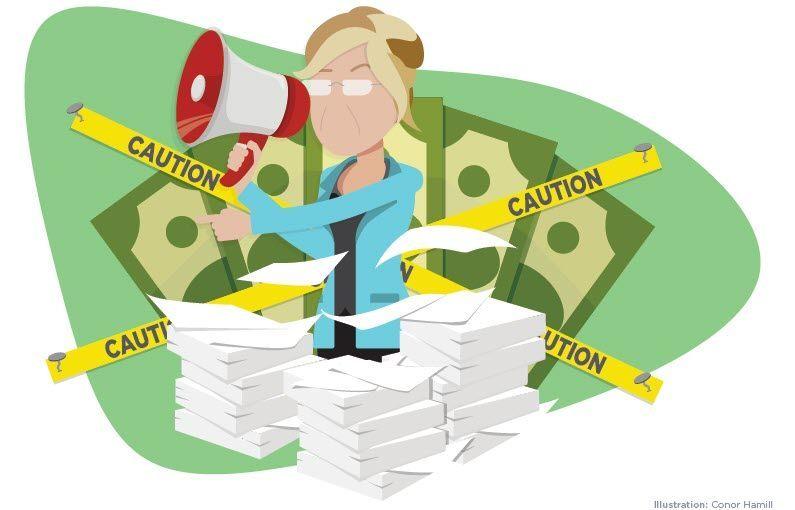There have been plenty of stories through the years about the lengths private equity firms have gone to protect their privacy. The best example, perhaps, came more than a decade ago when Stephen Feinberg, the co-founder of Cerberus Capital Management, unleashed a statement that could get a modern-day CEO fired.
“We try to hide religiously,” Feinberg reportedly told a group of investors. “If anyone at Cerberus has his picture in the paper and a picture of his apartment, we will do more than fire that person. We will kill him. The jail sentence will be worth it.”
But for firms such as Cerberus, the days of protecting secrecy at all costs could soon be over. Private equity has received intense, mounting scrutiny over the past couple of years from all angles. Notable examples include a failed investment in Toys R Us that led to roughly 33,000 job losses, the closing of Philadelphia’s Hahnemann University Hospital (which shut off care to many of the city’s poorest residents), and the recent dismantling of popular sports blog Deadspin. Elsewhere, the industry has been blamed for job cuts at local newsrooms across the country and healthcare patients getting hit with surprise out-of-network bills.
Distrust of private equity isn’t new, and that discourse won’t change if presidential candidate Elizabeth Warren wins the Democratic primary and then beats President Donald Trump in the 2020 election. Over the past few months, Warren has attacked PE time and again, comparing firms to vampires that bleed companies dry while enriching themselves and also introducing jarring legislation that would upend the industry. A recent example of her charge came in November when she posted a BuzzFeed op-ed to Twitter that was written by a former Toys R Us worker with the headline “Private equity is the enemy of working people everywhere.”
“When private equity firms acquire companies, suck out all the value they can, and walk away rich—leaving workers, their families and their communities suffering with the consequences—it’s legalized looting,” Warren wrote on Twitter. “I have a plan to end it.”
All that said, now would be a good time for private equity firms to be more transparent, especially about their investments that don’t pan out. The industry has long tried to distance itself from its reputation as corporate raiders, or “Barbarians at the Gate,” a label it gained from KKR’s hostile takeover of RJR Nabisco in the 1980s. And it has made strides over the past couple of decades, in part by improving operational efficiency at previously distressed businesses.
But there is still more that could be done. Releasing metrics on returns and fund performance, or showing where money is being invested, would be a good start in changing the narrative. The Deadspin debacle aside, Boston-based growth firm Great Hill Partners lists case studies of successful investments on its website, giving the public a view of how it organically drives revenue. Why not follow that lead?
When things go bad, explaining why certain decisions are made—such as cutting costs—just might help slow down the nearly constant stream of negative rhetoric around private equity.
Because even if Warren ultimately loses, the PE industry could face a new reality in the next few years. In July, Warren introduced the “Stop Wall Street Looting Act” along with fellow senators Tammy Baldwin (D-Wisc.), Sherrod Brown (D-Ohio) and House of Representatives members Mark Pocan (D-Wisc.) and Pramila Jayapal (D-Wash).
“For far too long, Washington has looked the other way while private equity firms take over companies, load them with debt, strip them of their wealth, and walk away scot-free—leaving workers, consumers, and whole communities to pick up the pieces,” Warren said in the bill.
A former Harvard professor that’s based her campaign on a series of detailed policy positions, Warren has described herself as a capitalist. Her bill, however, would fundamentally change the private equity landscape. It includes provisions to roll back the carried interest loophole so that capital gains income would be taxed higher as ordinary income; it requires firms to share in their portfolio companies’ debt, legal judgments and pension-related obligations; and it bans dividends within the first two years of owning a company. In addition, PE firms would be required to disclose fees and returns so that LPs can monitor their activities.
Warren’s plan has drawn widespread condemnation from the financial sector, though a few anonymous Wall Street executives admitted to Vox Media that some type of reform is needed. The American Investment Council, a lobbying group that represents the private equity industry, took a measured tone when asked for a response to the bill.
“Private equity is an engine for American growth and innovation, especially in Senator Warren’s home state of Massachusetts,” the AIC said in a statement. “Extreme political plans only hurt workers, investments and our economy.”
The lobbying group also pointed to a recent study they commissioned which found that—surprise!— private equity was the highest-performing asset class for public pension funds, with a median 10-year annualized return of 8.6%. Those returns benefit retirement accounts of teachers, first responders and other public servants.
In November, the US Chamber of Commerce released a report that detailed what could happen if the “Stop Wall Street Looting Act” became law. Among the key findings: between 6.9 million and 26.3 million jobs would be lost in the US, governments would lose $475 billion in tax revenue and investors would lose up to $3.4 billion annually. Per the study, the private equity industry itself could eventually cease to exist.
Even amid PE’s somewhat uncertain future, the public stock of high-profile firms is becoming more accessible than ever to common retail investors. Giants such as Blackstone, KKR and Apollo Global Management have all recently flipped from publicly traded partnerships to C-Corps, making their shares more open to mutual funds and ETFs found in many retirement accounts. The Carlyle Group will follow suit and make the flip on January 1.
One could argue that greater accessibility to retail investors comes with elevated responsibility to both shareholders and the public at large to be more transparent—and even participating financially in the downside rather than just the upside. KKR and Bain Capital, the latter of which is private, took a step in that direction last year when they committed $20.0 million to a fund for the workers laid off when Toys R Us was liquidated by creditors. But it took a good deal of public shaming first. Why not do it before the pressure reaches a boil?
During Blackstone’s most recent earnings call, co-founder and CEO Stephen Schwarzman went out of his way to dispel the negative narrative surrounding private equity. Stepping away from his book tour to tout the firm’s investment record, he said only one Blackstone-owned portfolio company from over 700 investments has gone bankrupt over the past 15 years and none of those companies have been liquidated. During that timeframe, he claims Blackstone has created 100,000 net jobs.
“That’s a pretty remarkable record,” Schwarzman said.
And he’s not wrong. It’s a big reason why Blackstone now has a whopping $554.0 billion in AUM and expanded into other alternative asset classes such as real estate, hedge funds and credit in a big way.
But the firm has also been involved in a number of controversies recently. For instance, the United Nations alleged earlier this year that Blackstone-backed Invitation Homes was responsible for driving low-income tenants from single-family homes; more specifically, the firm would often acquire low-income rental properties, make renovations, then increase the price whether residents could afford it or not. Blackstone responded to the UN shortly thereafter, citing factual errors and inaccurate conclusions without offering much definitive counterevidence.
If Warren gets elected, the firm will have more than just the UN to answer to—even if she’s checked in the near term by a Republican-controlled Senate and a conservative Supreme Court. But private equity firms don’t have to wait until change is mandated or legislated. They could open up and get ahead of the narrative, for once. Maybe even win back a little goodwill.
Source: PitchBook
Can’t stop reading? Read more
Apollo maintains discipline as it withdraws $2.1bn bid for Papa John’s
Apollo maintains discipline as it withdraws $2.1bn bid for Papa John’s Apollo Global Management...
Microsoft partners with Silver Lake-backed G42 for $15bn UAE data centre expansion
Microsoft partners with Silver Lake-backed G42 for $15bn UAE data centre expansion Microsoft and...
Monarch Collective makes first European investment with 38% stake in FC Viktoria Berlin Women
Monarch Collective makes first European investment with 38% stake in FC Viktoria Berlin Women US...




